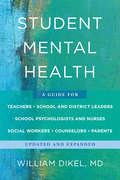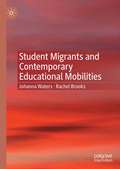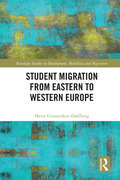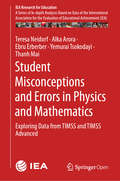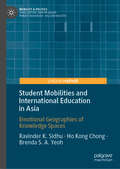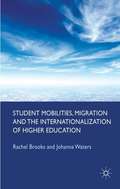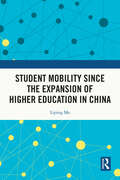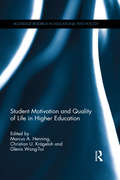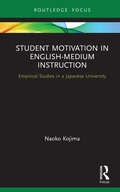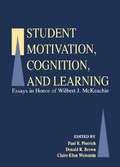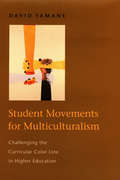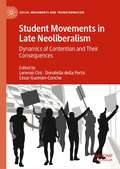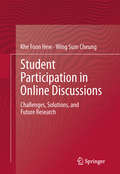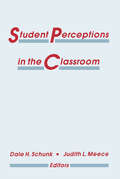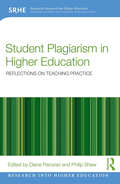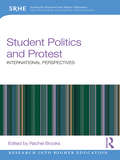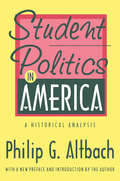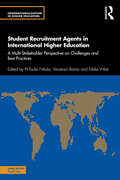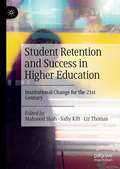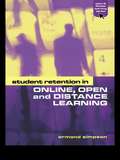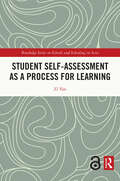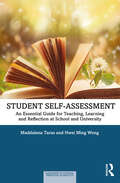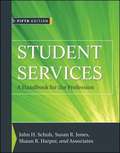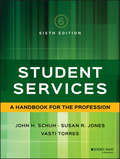- Table View
- List View
Student Mental Health: A Guide For Teachers, School And District Leaders, School Psychologists, Social Workers, Counselors, Parents, And Clinicians Updated And Expanded
by William DikelFrom ADHD to schizophrenia and everything in between, what you need to know about how kids’ mental health impacts them in school. Chances are that every classroom in America will have at least one student who has a mental health disorder, possibly even in the severe range. These students often have symptoms that interfere with their ability to learn. By understanding child and adolescent mental health issues, you will have additional tools to provide the most successful educational and home environments for school- aged kids.
Student Migrants and Contemporary Educational Mobilities
by Rachel Brooks Johanna WatersThis book explores questions around the meaning and significance of international student migration. Framed in relation to the mobilities – and immobilities – of international students, the book highlights various key themes emerging from the rich interdisciplinary scholarship in this area, including socio-economic diversification in mobile students, the differential value of international higher education, and citizenship and state-building projects. It also discusses the importance of considering ethics in relation to student migrants. This pioneering book will be of interest and value to scholars of student mobilities and the international student experience more widely, as well as practitioners and policy makers.
Student Migration from Eastern to Western Europe (Routledge Studies in Development, Mobilities and Migration)
by Mette Ginnerskov-DahlbergThis book explores European student migration from the perspectives of Eastern European students moving to Western Europe for study. Whilst most research on student migration in Europe focuses on the experiences of Western European students, this book uniquely casts a light on Eastern European student migrants moving to the ‘West’. Mette Ginnerskov-Dahlberg deploys a novel approach to the subject by drawing on insights gleaned from a longitudinal study of master's students pursuing an education abroad and their multifaceted journeys after graduation. Thereby, she brings their narratives to life and highlights the changes and continuities they experienced over a period of seven years, fostering an understanding of student mobility as an activity enmeshed with adult commitments and long-term aspirations. Using Denmark as a case study of a host country, Ginnerskov-Dahlberg analyses the trajectories of these students and situates their experiences within the wider socio-historical context of Eastern European post-socialism and the contemporary dynamics between EU and non-EU citizens in the welfare state of Denmark – reflecting issues playing out on the global stage today. This book will be a valuable resource for students and scholars of migration and mobility studies, as well as human geography, sociology, higher education, area studies and anthropology.
Student Misconceptions and Errors in Physics and Mathematics: Exploring Data from TIMSS and TIMSS Advanced (IEA Research for Education #9)
by Teresa Neidorf Alka Arora Ebru Erberber Yemurai Tsokodayi Thanh MaiThis open access report explores the nature and extent of students’ misconceptions and misunderstandings related to core concepts in physics and mathematics and physics across grades four, eight and 12. Twenty years of data from the IEA’s Trends in International Mathematics and Science Study (TIMSS) and TIMSS Advanced assessments are analyzed, specifically for five countries (Italy, Norway, Russian Federation, Slovenia, and the United States) who participated in all or almost all TIMSS and TIMSS Advanced assessments between 1995 and 2015.The report focuses on students’ understandings related to gravitational force in physics and linear equations in mathematics. It identifies some specific misconceptions, errors, and misunderstandings demonstrated by the TIMSS Advanced grade 12 students for these core concepts, and shows how these can be traced back to poor foundational development of these concepts in earlier grades. Patterns in misconceptions and misunderstandings are reported by grade, country, and gender. In addition, specific misconceptions and misunderstandings are tracked over time, using trend items administered in multiple assessment cycles. The study and associated methodology may enable education systems to help identify specific needs in the curriculum, improve inform instruction across grades and also raise possibilities for future TIMSS assessment design and reporting that may provide more diagnostic outcomes.
Student Mobilities and International Education in Asia: Emotional Geographies of Knowledge Spaces (Mobility & Politics)
by Brenda S. Yeoh Ravinder K. Sidhu Ho Kong ChongThis book investigates why students choose to study in key Asian cities, and how this trend relates to the strategic intent of states and universities to build ‘knowledge economies’ and ‘world-class’ profiles. Drawing on substantial theoretical and empirical research, the authors examine the emotional geographies of East Asian international education, and offer new analytical insights into the relations between emotions, nation and subjectivity. The book challenges Eurocentric views of Asia as a space of volatile nationalist rivalries. By offering richly textured portraits of mobile students, it questions contemporary memes about the utility-maximising Asian learner. This is a thought-provoking text that will appeal to university researchers, academics and students interested in the changing architectures of international education.
Student Mobilities, Migration and the Internationalization of Higher Education
by Rachel Brooks Johanna WatersThis book develops a comprehensive understanding of the motivations and experiences of students who choose to study abroad for the whole or part of a degree. It includes case studies of students from East Asia, Europe and the UK, and considers the implications of their movement for contemporary higher education.
Student Mobility Since the Expansion of Higher Education in China
by Liping MaThis book examines the characteristics of Chinese college students' mobility since the expansion of higher education by using a nationally representative data set. It analyzes college graduates' mobility from both horizontal and vertical dimensions. The horizontal dimension shows college students' migration directions and location changes, including migration for college, migration for employment, migration for grassroots positions, migration away from the capital, and migration back to their hometown. The vertical dimension includes students' intergenerational occupational mobility and intergenerational regional mobility. Drawing on theories of education and economics, the book provides a solid framework for empirically analyzing the characteristics, causes, and economic and non-economic benefits of different forms of mobility. This book not only offers insights into China's higher education policies and their impact on the regional and intergenerational mobility decisions of college graduates over the past two decades, but also has important implications for countries at similar stages of social and economic development. This book is an excellent read for students and scholars of education, economics, and East Asian studies. It can also help policymakers understand the characteristics of students' mobility and the underlying reasons for their choices, so that they can propose effective policies in the future.
Student Motivation and Quality of Life in Higher Education (Routledge Research in Educational Psychology)
by Marcus A. Henning Christian U. Krägeloh Glenis Wong-ToiHigher education is a high stakes process involving engagement with curricula and often entails coping with the onslaught of assessments and examinations. This process creates a level of intensity that impacts on the student experience in higher education. It is, therefore, important to consider not only the motivational aspects of learning but also quality of life issues, as they have profound effects on students. Quality of life affects the way students interact with their formal education, and has wide-reaching effects on future careers and their ability to coordinate everyday events. Integrating these two concepts, student motivation and quality of life, brings together the explicit elements that underpin learning in the higher education context, creating links between the affective and social aspects of the student life. This synthesis is integral to improving student retention and quality of life and has important ramifications for educationalists, administrators, pastoral care and academic support service personnel, and students themselves. Some highlights of the book include: Applied Positive Psychology in Higher Education Internationalisation and Quality of Life: A Taiwanese Perspective The Computer Assisted Learning for the Mind (CALM) Website: Teaching Skills to Increase Resilience The Oxford University Peer Support Programme: Addressing the Wellbeing of Students Higher Education and Student Stress: Reclaiming Light, Liberty and Learning Improving academic quality of life through attribution- and motivation-focused counselling
Student Motivation in English-Medium Instruction: Empirical Studies in a Japanese University (Routledge Focus on English-Medium Instruction in Higher Education)
by Naoko KojimaThis book explores Japanese students’ learning experiences and challenges in English medium instruction (EMI) from motivational perspectives. Using self-determination theory (SDT) as the framework, the first part reveals a lack of the three psychological needs of SDT (autonomy, competence, relatedness) that cause loss of students’ initial interest in learning English language and content. The author outlines pedagogical interventions that can be implemented in order to make the learning environment better. The second half of the book shows the effects these interventions had on the fulfillment of the three psychological needs, especially perceived relatedness and autonomy. In conclusion, the author focuses on the importance of listening to Japanese students’ voices and building a community that can motivate students, thus maximizing the pedagogical effectiveness of EMI. This volume will be useful to anyone involved in motivation, language learning or EMI research, pedagogy or practice.
Student Motivation, Cognition, and Learning: Essays in Honor of Wilbert J. Mckeachie
by Paul R. Pintrich Donald R. Brown Claire Ellen WeinsteinDesigned to present some of the current research on student motivation, cognition, and learning, this book serves as a festschrift for Wilbert J. McKeachie who has been a leading figure in college teaching and learning. The contributions to this volume were written by former students, colleagues and friends. A common focus on a general or social cognitive view of learning is shared throughout the volume, but there are significant differences in the perspectives the researchers bring to bear on the issues. They provide an excellent cross-section of current thinking and research on general cognitive topics such as students' knowledge structures, cognitive and self-regulated learning strategies, as well as reasoning, problem solving, and critical thinking. Social cognitive and motivational topics are also well represented, including self-worth theory and expectancy-value models. More importantly, an explicit attempt is made to link cognitive and motivational constructs theoretically and empirically. This area of research is one of the most important and promising areas of future research in educational psychology. Finally, most of the chapters address instructional implications, but several explicitly discuss instructional issues related to the improvement of college students' motivation and cognition.
Student Movements for Multiculturalism: Challenging the Curricular Color Line in Higher Education
by David YamaneBeginning with the premise that a comprehensive understanding of American life must confront the issue of race, sociologist David Yamane explores efforts by students and others to address racism and racial inequality—to challenge the color line—in higher education. By 1991, nearly half of all colleges and universities in the United States had established a multicultural general education requirement. Yamane examines how such requirements developed at the University of California at Berkeley and the University of Wisconsin at Madison during the late 1980s, when these two schools gained national attention in debates over the curriculum. Based on interviews, primary documents, and the existing literature on race and ethnic relations, education, cultural conflict, and the sociology of organizations, Student Movements for Multiculturalism makes an important contribution to our understanding of how curricular change occurs and concludes that multiculturalism represents an opening, not a closing, of the American mind.
Student Movements in Late Neoliberalism: Dynamics of Contention and Their Consequences (Social Movements and Transformation)
by Donatella Della Porta Lorenzo Cini César Guzmán-ConchaThis book inquires into the global wave of student mobilizations that have arisen in the aftermath of the economic crisis of 2008, accounting for their historical and sociological significance. More specifically, its eleven chapters explore the role of students as political actors: their ability to build effective organizations, to make political alliances with other actors, and to win public consensus, as well as their impact on cultural, political, and policy outcomes. To do so, the volume examines case studies in England, Chile, South Africa, Quebec, and Hong Kong, covering Europe, Africa, Asia, and North and Latin America. Grouped into two major sections, the collection covers the organizational structures of student movements and their alliances and outcomes. Ultimately, this volume examines the understudied political aspects of student unrest, exploring how student mobilizations—driven by indebtedness, precariousness, the corporatization of the university, and other issues—correspond to larger processes of change with wider implications in society.
Student Participation in Online Discussions
by Khe Foon Hew Wing Sum CheungThe increasingly prevalent use of online- or blended-learning in schools universities has resulted in asynchronous online discussion forum becoming an increasingly common means to facilitate dialogue between instructors and students, as well as students and students beyond the boundaries of their physical classrooms. This proposed academic book contributes to the literature on asynchronous online discussions in the following three main ways: First, it reviews previous research studies in order to identify the factors leading to limited student contribution. Limited student contribution is defined as students making few or no postings, students exhibiting surface-level thinking or students demonstrating low-level knowledge construction in online discussions. It then identifies the various empirically-based guidelines to address the factors. Second, three potential guideline dilemmas that educators may encounter: (a) use of grades, (b) use of number of posting guideline, and (c) instructor-facilitation are introduced. These are guidelines where previous empirical research shows mixed results when they are implemented. Acknowledging the dilemmas is essential for educators and researchers to make informed decisions about the discussion guidelines they are considering implementing. Third, nine exploratory case studies related to student-facilitation and audio-based discussion are reported on and examined. Using students as facilitators may be an alternative solution to educators who wish to avoid the instructor-facilitation guideline dilemma. Using audio discussion would be useful for participants with poor typing skills or those who prefer talking to typing. The proposed book is distinctive in comparison to current competitor titles because all the findings and guidelines are empirically-based. Furthermore, the nine expanded case studies provided specifically address the issue of student/peer facilitation and audio-based discussion. Student/peer facilitation and audio discussion are two areas that hitherto received comparatively lesser attention compared to instructor facilitation and text-based discussion.
Student Perceptions in the Classroom
by Dale H. Schunk Judith L. MeeceThis book's two primary objectives are to present theory and research on the role of learners' achievement-related perceptions in educational contexts and to discuss the implications of this research for educational practices. Although contributors share the view that students' perceptions exert important effects in achievement settings, they differ in diverse ways including their theoretical orientation, their choice of research methodology, the perceptions they believe are of primary importance, and the antecedents and consequences of these perceptions. They discuss the current status of their ideas and provide a forward look at research and practice.
Student Plagiarism in Higher Education: Reflections on Teaching Practice (Research into Higher Education)
by Philip Shaw Diane PecorariStudent Plagiarism in Higher Education is a crucial read for any university teacher concerned about plagiarism. It provides the tools and information needed to assess this often complex international phenomenon constructively and effectively from a variety of angles, and provides a framework for further discussion and research. Each chapter poses a question about an essential aspect of plagiarism and examines the central theoretical, ethical and technical questions which surround it. Providing a unique perspective on the topic of academic plagiarism, this book: addresses questions which are vexing in teaching practice, but for which ready answers are not available in professional skills development materials; relates plagiarism to wider issues of learning and intellectual development; collates the thinking of international leading experts on the topic of plagiarism from different areas of the academy. Student Plagiarism in Higher Education provides an excellent insight which thoroughly interrogates all aspects of the plagiarism argument. Theoretically based and carefully considered contributions from international experts ensure that this volume is an invaluable asset to anyone wishing to read more, learn more and think more about plagiarism.
Student Politics and Protest: International perspectives (Research into Higher Education)
by Rachel BrooksDespite allegations of political disengagement and apathy on the part of the young, the last ten years have witnessed a considerable degree of political activity by young people – much of it led by students or directed at changes to the higher education system. Such activity has been evident across the globe. Nevertheless, to date, no book has brought together contributions from a wide variety of national contexts to explore such trends in a rigorous manner. Student Politics and Protest: International Perspectives offers a unique contribution to the disciplines of education, sociology, social policy, politics and youth studies. It provides the first book-length analysis of student politics within contemporary higher education comprising contributions from a variety of different countries and addressing questions such as: What roles do students’ unions play in politics today? How successful are students in bringing about change? In what ways are students engaged in politics and protest in contemporary society? How does such engagement differ by national context? Student Politics and Protest: International Perspectives explores a number of common themes, including: the focus and nature of student politics and protest; whether students are engaging in fundamentally new forms of political activity; the characteristics of politically engaged students; the extent to which such activity can be considered to be ‘globalised’; and societal responses to political activity on the part of students. Student Politics and Protest: International Perspectives does not seek to develop a coherent argument across all its chapters but, instead, illustrate the variety of empirical foci, theoretical resources and substantive arguments that are being made in relation to student politics and protest. International in scope, with all chapters dealing with recent developments concerning student politics and protest, this book will be an invaluable guide for Higher Education professionals, masters and postgraduate students in education, sociology, social policy, politics and youth studies.
Student Politics in America: A Historical Analysis (Foundations Of Higher Education Ser.)
by Philip G. AltbachStudents have periodically played an important role in campus political life as well as in societal politics. Students were active in the anti-slavery movement; they rebelled against military service in the Civil War; they staged demonstrations during the Depression; and they were vocal during the 1960s. While activism has subsided somewhat in the past three decades, students continue to be involved in significant political issues. Student Politics in America is the first book to chronicle the entire history of student political activism in America dealing not only with the periods when students were dramatically involved in politics, but also focusing on less active periods.This book provides a sense of the entire history of political involvement and the evolution of student organizations and attitudes toward politics. Student religious organizations that have been involved in social activism are discussed, as are student government organizations, which are generally ignored in analyses of campus life. Altbach shows that, at least since the 1930s, there is an ideological trend toward liberal and radical activism, yet at the same time conservative student organizations have also been influential. Politics on the campus is a multifaceted phenomenon, and Altbach handles the complexity of student political life in a carefully nuanced manner.In a new preface, the author discusses his reasons and motivation for originally writing Student Politics in America. In his new introduction, he brings the history of student activism, and the lack thereof, up to date. Student Politics in America provides a unique historical perspective on the political activities of college and university students in the United States and will be an important contribution to the personal libraries of educators, university administrators, students, political scientists, and historians.
Student Recruitment Agents in International Higher Education: A Multi-Stakeholder Perspective on Challenges and Best Practices (Internationalization in Higher Education Series)
by Pii-Tuulia Nikula Vincenzo Raimo Eddie WestWith a focus on the growing number of institutions employing commercial agents to support international student recruitment, Student Recruitment Agents in International Higher Education provides an evidence-based exploration of this phenomenon, and will increase the reader’s understanding of the multiple dimensions of agent engagement, its contradictions and complexities.This book explores who and what these education agents are, what students and higher education institutions can expect from a good agent, how bad agents can be identified and avoided, and what we learn from the reasons for the development of these agents in the first place. Offering theoretical perspectives with practical applications, this volume features contributions from academics and scholar-practitioners, laying out fresh perspectives and insights on topics such as process transparency, developing agent policy and procedures, and government regulations.Providing the ideal reference for students embarking on international study, agents, higher educational institutions, government/accreditation agencies, researchers, and practitioners, this insightful book acts as a critical basis for further research and improvements in higher education practice.
Student Resistance to Dictatorship in Chile, 1973-1990: 'Security to Study, Freedom to Live!' (Palgrave Studies in the History of Social Movements)
by Richard G. SmithThis book documents and analyses Chilean university and school students’ opposition to the Pinochet regime during the latter years of the 1970s and the 1980s. The book focuses on key episodes such as the establishment of cultural groups within the militarily controlled universities that enabled students to congregate and exchange ideas for the first time since the 1973 coup; how university and secondary school students created their own democratic institutions to challenge the regime-appointed bodies; and how these eventually led to the restoration of the national federations that had been banned by the military government. The author explores the key relationship between the vertically organised, underground political parties, and the horizontally organised, broad, non-partisan organisations created by the students, arguing that this structure brought advantages to the movement. The students’ contribution to the national protests in the 1980s ensured that opposition to the regime was highly visible in the city centre, resulting in a socially broadened opposition with a focus on youth, rather than disenfranchisement and poverty. Offering a detailed account of different forms of student activism, this book evaluates the role of school and university students within the broader anti-dictatorship opposition in Chile.
Student Retention and Success in Higher Education: Institutional Change for the 21st Century
by Mahsood Shah Liz Thomas Sally KiftThis book draws together international research to assess the quality of successful efforts to retain students. The editors and contributors unite diverse global research from countries who have led student retention and success projects at national, institutional, faculty or program level with positive outcomes. The book is underpinned by the philosophy that a more diverse student population requires higher education institutions to fundamentally change, in order to facilitate the success of all students. All of humanity, its economies and societies, are being pummelled by waves of pandemic-induced crises in tandem with globalisation and demographic shifts. Ultimately, this book acts as a clarion to higher education institutions to better support and retain their students, in order to create a more stable learning environment.
Student Retention in Online, Open and Distance Learning (Open and Flexible Learning Series)
by Ormond SimpsonStudent retention has become a key issue for all further and higher education institutions and is a major concern among those involved in online learning courses where retention rates are often even poorer than those for traditional campus-based courses. There is increasing recognition that student retention is the responsibility of the actual institutions running the courses, and that it is within their power to encourage sustained participation without compromising academic standards.In this book, Ormond Simpson provides a clear, accessible analysis of what works and at what cost. He outlines strategies for increasing retention, providing useful case studies and examples to illustrate how these strategies can change institutional policy and practice. Areas covered include:* Who drops out and why* Integration* Reclamation* 'Retentioneering' an institution* Recruitment and retention* Course design.
Student Self-Assessment as a Process for Learning (Routledge Series on Schools and Schooling in Asia)
by Zi YanCovering both higher education and school education, this book contributes to the field of assessment by providing a systematic account of student self-assessment based on a consistent conceptualisation. Yan advocates viewing self-assessment as an active and reflective process and using it as a learning strategy rather than an assessment method. He builds on a newly-developed self-assessment model adopting a process perspective and synthesises a series of interrelated empirical investigations into the whole "chain" of student self-assessment research. The research encompassed in the volume spans from self-assessment practices and measurement, through predictors of self-assessment, its interweaved relationship with self-regulated learning and feedback literacy, impact on student learning outcomes, to designing sustainable self-assessment interventions. The empirical evidence is from a wide range of current scholarship to ensure that the principles and implications conveyed are applicable internationally. Policymakers, students and scholars in educational assessment, educational psychology, and teaching and instruction will find the theoretical explorations and empirical investigations contained within useful, to show how student self-assessment could be better conceptualised, researched, and practised.
Student Self-Assessment: An Essential Guide for Teaching, Learning and Reflection at School and University (Assessment in Schools: Principles in Practice)
by Maddalena Taras Hwei Ming WongThis book provides the basics of student self-assessment and implementation challenges, and it offers practical solutions and examples for navigating the use of student self-assessment in various subject disciplines in primary schools, secondary schools and higher education. It provides an informed approach for educators to understand the complexities and subtleties involved in implementing self-assessment, and how this might include and impact on teachers and students. Involving students in assessment is not a new idea nor is student self-assessment a new assessment tool in schools. Despite the advantages and the necessity for including it in our pedagogic processes explicitly, the use of student self-assessment has been far from commonplace and consistent in classrooms, schools and universities. This book makes clear the choices of what, how and why student self-assessment is important and usable in the classroom. This book is designed for educators at different levels, and educational researchers. It will provide food for thought for pre- and in-service teachers and school leaders who are interested in nurturing independent and self-directed learners by involving students in the assessment process and maximising student learning through the use of student self-assessment.
Student Services
by John H. Schuh Susan R. Jones Shaun R. HarperSince it was first published, Student Services has become a classic reference in the field. In this edition, a new cast of student affairs scholars examines the student experience in higher education; the evolution of the role of student affairs professionals; and the philosophies, ethics, and theories that guide the practice of student affairs work. The fifth edition covers a broad range of relevant topics including legal issues, managing student affairs programs, leadership, conflict resolution, community development professionalism, developing institutional partnerships, and the future of the field.
Student Services: A Handbook for the Profession (J-b Ss Single Issue Student Services Ser.)
by John H. SchuhThe bestselling student affairs text, updated for today's evolving campus Student Services is the classic comprehensive text for graduate students in student affairs, written by top scholars and practitioners in the field. Accessible and theoretically grounded, this book reflects the realities of contemporary practice in student affairs. This new sixth edition has been updated throughout to align with current scholarship, and expanded with four new chapters on student development, crisis management, programming, and applications. Twenty new authors join the roster of expert contributors, bringing new perspective on critical issues such as ethical standards, campus culture, psychosocial development, student retention, assessment and evaluation, and much more. End-of-chapter questions help reinforce the material presented, and unique coverage of critical theoretical perspectives, counseling and helping skills, advising, leadership, environmental theories, and other useful topics make this book a foundational resource for those preparing for a student affairs career. The student affairs staff has the responsibility for a vast array of services and support roles for students on every type of campus. This book provides a thorough overview of the field's many facets, with invaluable real-world insight from leading practitioners. Understand the theoretical bases of development, learning, identity, and change Delve into the organizational frameworks vital to any institution Learn the historical context of higher education and the student affairs role Master essential competencies including professionalism, supervision, crisis management, and more As colleges and universities offer more and more services to an increasingly diverse student population, the responsibility for these programs falls to student affairs educators. The role requires a broad skill set, and conceptual grounding in a number of disciplines. Student Services provides the most complete overview of the foundations, philosophies, ethics, and theories that guide today's student affairs professional.
